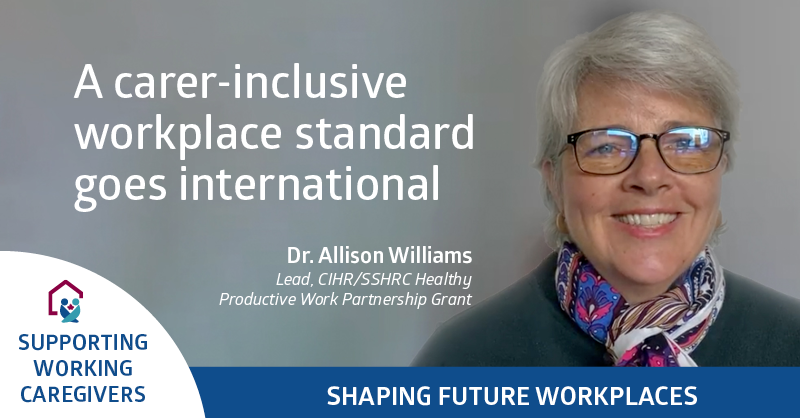A carer-inclusive standard for the workplace goes international
Supporting caregivers in the workplace makes good business sense. Furthermore, it acknowledges the humanity of the workforce. Carer-inclusive standards are resources that can help employers to achieve more inclusivity and should be a measure of all organizations.
One in four Canadians are carers, with 75% of these also simultaneously employed in the labour market. Lack of workplace support can result in these individuals, also known as worker-carers, leaving the workforce, missing workdays, taking early retirement, and experiencing reduced productivity. These costs to employers can be avoided and workers can be well supported to continue their employment.
To respond to the need in the workplace, the Canadian Standards Association (CSA) Group a leader in standards research, development, education and advocacy, collaborated with researchers at McMaster University to develop a new standard: B701-17 – Carer-inclusive and accommodating organizations and implementation guide, B701HB-18 – Helping worker-carers in your organization. Published in 2017 and currently available for FREE download, the voluntary standard is a set of guidelines which helps care workers balance caregiving and paid work and puts the onus on the workplace organization or the employer to accommodate worker-carers.
In 2017, responding to changing societal needs globally, ISO (International Organization for Standardization) established a technical committee (TC) responsible for standards in the field of ageing societies. Amongst the committee’s priorities is carer-inclusive organizations, with Working Group 3 tasked to develop standards for carer-inclusive and accommodating organizations. Development of the standard began in May 2019, leveraging the work by the CSA Group. In December 2021 ISO’s TC314 Ageing Societies launched the ISO 25551:2021(en) Ageing societies — General requirements and guidelines for carer-inclusive organizations. This is the first international standard for worker-carers and provides an opportunity for change in workplaces around the world.
The release of the new carer’s standard highlights the importance of caregiving as one of the most important social and economic issues worldwide. As the population ages, caregivers will play an increasing critical role in every society, providing substantial economic value globally.
Both the CSA Group and the ISO standards specify requirements and provide guidelines for an organizational program for worker-carers providing care to adult care recipients and long-term childcare recipients. The carer-inclusive standards are applicable to any organization, regardless of size, sector, or community setting. The standards can be used in conjunction with an organization’s management systems, human resource programs, and/or equity, diversity, and inclusion programs, or on its own in the absence of a formal workplace program to support worker-carers.
Components of the standard include:
- An environmental scan of the workplace and employee pool to determine numbers and needs
- Addressing and ensuring confidentiality for workers to avoid stigmatization of carers
- Increasing awareness of organizational culture and becoming more carer-friendly
- Management training, particularly frontline supervisors and managers, and human resource staff
- Awareness campaigns for workers and management
- Offering accommodation tailored to the specific workplace
The carer-inclusive and accommodating organizations standards are available for use by organizations around the world providing a set of guidelines for employers to be more aware of and responsive to carer-employees.
ABOUT THE PROJECT
Carers Canada is leading the knowledge mobilization activities for a multi-sectorial research program to spread and scale a carer-friendly workplace standard, known as the ‘Carer-Inclusive and Accommodating Organizations’ Standard (CSAB701-17). Led by Dr. Allison Williams, CIHR Research Chair in Gender, Work and Health at McMaster University, the research program consists of six inter-related sub-projects that will: increase awareness of the standard across Canada; evaluate readiness to change; determine feasibility and cost benefit; embrace cultural competency; consider Indigenous perspectives; and create an international standard. Learn more

CIHR/SSHRC Healthy Productive Work Partnership Grant “Scaling up the Career Inclusive Accommodating Organizations Standard” FRN: HWP-146001 (CIHR); 890-2016-3018 (SSHRC).
 Allison WilliamsJanuary 24, 2022
Allison WilliamsJanuary 24, 2022
A carer-inclusive standard for the workplace goes international
Supporting caregivers in the workplace makes good business sense. Furthermore, it acknowledges the humanity of the workforce. Carer-inclusive standards are resources that can help employers to achieve more inclusivity and should be a measure of all organizations.
One in four Canadians are carers, with 75% of these also simultaneously employed in the labour market. Lack of workplace support can result in these individuals, also known as worker-carers, leaving the workforce, missing workdays, taking early retirement, and experiencing reduced productivity. These costs to employers can be avoided and workers can be well supported to continue their employment.
To respond to the need in the workplace, the Canadian Standards Association (CSA) Group a leader in standards research, development, education and advocacy, collaborated with researchers at McMaster University to develop a new standard: B701-17 – Carer-inclusive and accommodating organizations and implementation guide, B701HB-18 – Helping worker-carers in your organization. Published in 2017 and currently available for FREE download, the voluntary standard is a set of guidelines which helps care workers balance caregiving and paid work and puts the onus on the workplace organization or the employer to accommodate worker-carers.
In 2017, responding to changing societal needs globally, ISO (International Organization for Standardization) established a technical committee (TC) responsible for standards in the field of ageing societies. Amongst the committee’s priorities is carer-inclusive organizations, with Working Group 3 tasked to develop standards for carer-inclusive and accommodating organizations. Development of the standard began in May 2019, leveraging the work by the CSA Group. In December 2021 ISO’s TC314 Ageing Societies launched the ISO 25551:2021(en) Ageing societies — General requirements and guidelines for carer-inclusive organizations. This is the first international standard for worker-carers and provides an opportunity for change in workplaces around the world.
The release of the new carer’s standard highlights the importance of caregiving as one of the most important social and economic issues worldwide. As the population ages, caregivers will play an increasing critical role in every society, providing substantial economic value globally.
Both the CSA Group and the ISO standards specify requirements and provide guidelines for an organizational program for worker-carers providing care to adult care recipients and long-term childcare recipients. The carer-inclusive standards are applicable to any organization, regardless of size, sector, or community setting. The standards can be used in conjunction with an organization’s management systems, human resource programs, and/or equity, diversity, and inclusion programs, or on its own in the absence of a formal workplace program to support worker-carers.
Components of the standard include:
- An environmental scan of the workplace and employee pool to determine numbers and needs
- Addressing and ensuring confidentiality for workers to avoid stigmatization of carers
- Increasing awareness of organizational culture and becoming more carer-friendly
- Management training, particularly frontline supervisors and managers, and human resource staff
- Awareness campaigns for workers and management
- Offering accommodation tailored to the specific workplace
The carer-inclusive and accommodating organizations standards are available for use by organizations around the world providing a set of guidelines for employers to be more aware of and responsive to carer-employees.
Allison Williams completed her PHD at York University (Toronto, Canada) and, after holding permanent positions at both Brock University (St. Catharines, Ontario) and University of Saskatchewan (Saskatoon, Saskatchewan), is now a Professor in McMaster University’s School of Earth, Environment & Society (Hamilton, Ontario). Her background in social health and geography continue to inform policy development. Dr. Williams has held three Canadian Institutes of Health Research (CIHR) Research Chairs, the latest of which is the CIHR Institute of Gender and Health Chair in Gender, Work and Health. She teaches health geography, public health and research methods.
FAVORITE PASTIME: Being outdoors! Hiking & cycling in summer, and alpine & cross-country skiing in winter
Email – awill@mcmaster.ca
Website – https://ghw.mcmaster.ca
ABOUT THE PROJECT
Carers Canada is leading the knowledge mobilization activities for a multi-sectorial research program to spread and scale a carer-friendly workplace standard, known as the ‘Carer-Inclusive and Accommodating Organizations’ Standard (CSAB701-17). Led by Dr. Allison Williams, CIHR Research Chair in Gender, Work and Health at McMaster University, the research program consists of six inter-related sub-projects that will: increase awareness of the standard across Canada; evaluate readiness to change; determine feasibility and cost benefit; embrace cultural competency; consider Indigenous perspectives; and create an international standard. Learn more

CIHR/SSHRC Healthy Productive Work Partnership Grant “Scaling up the Career Inclusive Accommodating Organizations Standard” FRN: HWP-146001 (CIHR); 890-2016-3018 (SSHRC).
